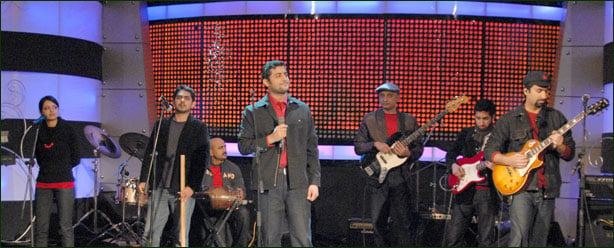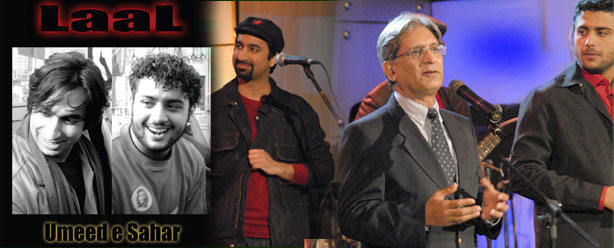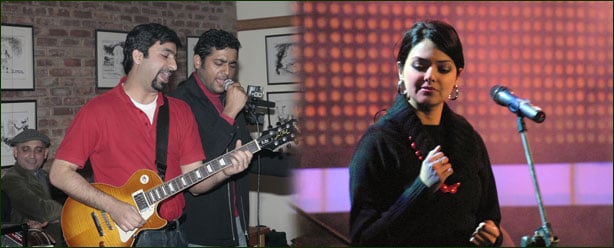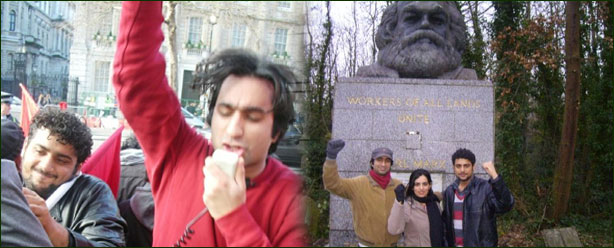|
|
| |
|
instep profile
Laal lead the way for a new musical order
By Saba Imtiaz
|
| |
 |
| |
|
Laal's
creation seems to have been best described by the Shair-e-Awam (Poet
of the Masses) Habib Jalib, who in the poem Dastoor wrote,
"Pakistan
banne ke baad,
Jab aik aik karke hamare khwab bikharnay lagay, tootnay lagay,
To apne humkhayalon ko hum ne dhoondna shuru kiya
Ke kistarah se hum mulk mai azadi, jamhooriat aur maushi azadi lasakein.
Khauf se pata nahee hilta tha, to yeh nazam Dastoor maine likhi
thi"
(After
Pakistan was created,
When our dreams began to shatter one by one
We began looking for like-minded people
To find out how we can bring freedom, democracy and economic freedom
to the country
Even a leaf wouldn't shake because of the terror, and then I wrote
the poem Dastoor)
The
iconic poet may have written these words decades ago, but the thought
behind them still holds true. The coming together of activists and
artistes and academics has been a tradition in Pakistan for any
movement that has seen a degree of success. That sentiment has seen
the birth of the band Laal, whose music is truly blazing a trail
for a revolutionary sound to enter Pakistan's airwaves.
The name Laal first appeared as it catapulted to households in the
country via their video for 'Mainay Uss Se Yeh Kaha', set to Habib
Jalib's verses from his poem Musheer. Based on what a 'lota' (sycophant)
advisor would say to the President (Jalib wrote it based on Hafeez
Jalandhari who was advisor to President Ayub Khan), with sarcastic
verses like 'das crore yeh gadhay jin ka naam hai awaam', and a
montage of clips that highlighted the previous government in power.
The instant question was: who are these musicians? |
| |
 |
| |
They
may be unbeknownst to a larger audience, but on the activist and
academic circuit they are well known. The brainchild of Taimur Rahman
and Shahram Azhar, Laal isn't just a band: it is a platform for
them to combine their activist and political ideologies with their
admiration for the progressive poetry that has been written in Pakistan.
It isn't just a band name either: the colour red signifies their
strong Communist beliefs and those loom large over their music.
Laal isn't Taimur and Shahram's full time focus. The two are academics,
currently working on their doctorate degrees in the UK. And away
from home, they have stayed true to their Marxist and activist leanings:
protesting against the Emergency imposition outside Downing Street,
speaking at conventions of the Communist Party in the UK and participating
in pro-China rallies to counter the pro-Tibet ones.
Taimur and Shahram have been joined in this musical journey down
a revolutionary road with Mahvash Waqar on backing vocals and Haider
Rahman on flute. The band gel well together, having been brought
together by a common love for the music and the ideology behind
it.
They aren't conventional musicians, completely unversed in the details
that musicians in Pakistan hanker over. While the jovial Taimur
can speak about a hundred words a minute on every topic under the
sky, at their album launch it was Shahram who spoke reams about
the poetry and motives behind their debut album, Umeed-e-Sahar,
delving into the history of Habib Jalib, the musical quality to
his poems and reciting verses at tandem. While Taimur switches from
the oft-repeated story of why Laal is making the music they are
to earthy Punjabi at random, Shahram is quieter and speaks in eloquent
Urdu at concerts, using phrases like 'aapki khidmat mai yeh pesh
karte hain'. When I asked them if they have a manager, Taimur wondered
aloud if they need one at which point I reassured them that they
seem entirely capable of managing the band themselves.
As the conversation turned to our mutual admiration for Abrar-ul-Haq,
Taimur asked, "Does Abrar have a manager?" - but then
his Abrar bubble was burst somewhat when during the conversation
he found out that the 'Billo' singer sang the theme song for the
PML-Q during the February 2008 elections. They do have their quirks
though, taking their name and belief literally, they dress in red
for their performances and video. They ponder about how their album
launch will go. And in a rather genuine manner, they asked attendees
at their album launch to invite all their friends to attend their
performance for the Geo TV show Applause. |
| |
 |
| |
The
story of how this band began may date back, as Taimur laughed when
asked the same question, to the 1800s, but is again, rather different.
Taimur and Shahram met while Taimur taught at the Lahore University
of Management Sciences where Shahram was one of his students. The
two bonded as Communist comrades and as activists desirous of change
in the country. The fact that they both were musically inclined
- Shahram has been classically trained while Taimur often played
the guitar during his classes - only furthered their comradeship,
one suspects.
Their admiration for the progressive artistes of Pakistan, notably
Faiz Ahmed Faiz and Habib Jalib, both who were also Communists,
has led to the album being a musical rendition of some of the firebrand
poetry these two icons wrote.
Laal aims to be a continuation from where the progressive artists
and writers society left off, and Taimur and Shahram aim to emulate
the ideals left behind by them. They are not making music for the
fame or the fan following, but this is truly 'for the people, by
the people'. When one quizzed them during an interview on how they
planned to promote their music, Taimur emphatically said: "guerilla
concerts!" This has been Taimur and Shahram's mainstay from
the start of their musical journey, where they performed for workers
in their houses, or how they now aim to continue to perform in the
same way. It is also a throwback to how Habib Jalib, the revolutionary
poet whose poems form the basis for most of Laal's songs, would
perform at press clubs, gatherings and political meetings, particularly
when Fatima Jinnah was fighting an election campaign against Ayub
Khan.
And they followed through with the example just last week at the
long march, by performing in Aabpara as protestors amassed and joining
in at the celebrations outside the Chief Justice's house to play
songs from their album. In a country where musicians tend to make
noises about politics and the current state of affairs yet do nothing
about it; Laal has changed the scope of Pakistani music in a big
way.
Laal's
triumphant euphoria after the reinstatement of the Chief Justice
was visible at their live performance telecast by Geo. As Shahram
sang 'Mainay Uss Se Yeh Kaha', he interspersed each couplet with
by talking about different advisors to President Zardari, which
was met with much cheer from the crowd - and from the hosts of the
concert, including Hamid Mir. Their energy was culled from the events
of March 15 and March 16, and Taimur said at the concert: "When
Shahram woke up this morning he said 'I won't be able to sing tonight'"
as Taimur aped Shahram's tired voice. But the live performance only
spoke of triumph and really, the hope of a new dawn, ala Umeed-e-Sahar.
And that hope has won them a lot of fans. By Taimur's own admission,
"we've had an enormously positive response, from the youth,
communists, socialists, progressives," and even Shahbaz Sharif
noted that the videos (most were of songs by Laal) Geo News kept
running the day of the long march played a role in the events of
the day.
|
| |
 |
| |
It's also
interesting to note how Laal coming onto the music scene has paved
the way for bands with a political ideology and belief to make
it to the mainstream. At their concert after the reinstatement
of the CJP, one could see Communist party flags waving from the
crowd - a sight I have never before seen at any concert in Pakistan
- much less at a concert being broadcast live.
Their earnestness to use music and poetry as a supporting vehicle
for the movement of change in Pakistan is refreshing. That has
translated into their video, 'Umeed-e-Sahar' (a poem by Faiz),
which depicts a scene of common injustice via the hands of passing
VIPs who cause blockades and stop even ambulances from passing
through. But standing up to that injustice, which is shown rather
optimistically in the video, showcases how to inspire change through
music.
And their album, Umeed-e-Sahar isn't just groundbreaking in the
sense that it comes at such a crucial juncture in Pakistan's history:
a time where we once again are faced with worsening conditions
on the political, economic and security fronts. It is important
because it seeks to refresh the foresight-laden words of progressive
poets like Faiz Ahmed Faiz and Habib Jalib, and revive them out
of the dusty books they have been shut up in and breathe live
in Technicolour. Faiz and Jalib both wrote poems that dealt with
oppression and tyranny, politics and history, dictators and democracy.
What Taimur and Shahram have attempted to do with this record
is to bring the spotlight back on to the messages that these progressive
icons brought forth in decades past.
And why not revive the message? In Pakistan, we exist in a perpetual
Memento/Ghajini-like state. Long-term sufferers of short-term
memory, we witness, year after year the same old drama orchestrated
by the same actors on the political arena. The alternative needs
to be brought forward, and what better way than through music?
It is the same motive that inspired Faiz and Jalib to write and
inspire change.
The album, Umeed-e-Sahar presents a world of poetic outcries.
Adapted to fiery poems, the songs are inherently catchy and have
that same effect that Iqbal Bano's rendition of Faiz's 'Hum Dekhenge'
does: the feeling of a heartfelt cry. While 'Zulmat Ko Zia' speaks
out against Zia-ul-Haq's era and speaks of a writer who is adamant
he can not sing praises of a dictator, 'Jaag Meray Punjab' highlights
the power centre province and how it must awaken otherwise Pakistan
may just drift apart and 'Mat Samjho' which talks about the conveniently
short memories politicians have. These are all songs that help
one understand the parallels between Pakistan's past and present.
In the same way that nationalistic songs like 'Dil Dil Pakistan'
and 'Jazba e Junoon' became anthems for an optimistic youth in
the early '90s, Umeed-e-Sahar aptly describes the sentiments that
the politically conscious youth of Pakistan feel. The icons of
Pakistan today are not Pakistani cricketers or musicians, but
they are figures like the Chief Justice or Aitzaz Ahsan. But as
Taimur aptly said when discussing the relevance of their album,
"In these circumstances, and whatever is happening, how can
we not be affected? We want to bring change and see justice."
|
| |
|

